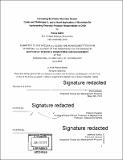| dc.contributor.advisor | Roberto Rigobon. | en_US |
| dc.contributor.author | Sekhri, Prerna | en_US |
| dc.contributor.other | Massachusetts Institute of Technology. Integrated Design and Management Program. | en_US |
| dc.coverage.spatial | s-cl--- | en_US |
| dc.date.accessioned | 2018-10-15T20:23:39Z | |
| dc.date.available | 2018-10-15T20:23:39Z | |
| dc.date.copyright | 2018 | en_US |
| dc.date.issued | 2018 | en_US |
| dc.identifier.uri | http://hdl.handle.net/1721.1/118522 | |
| dc.description | Thesis: S.M. in Engineering and Management, Massachusetts Institute of Technology, System Design and Management Program, 2018. | en_US |
| dc.description | Cataloged from PDF version of thesis. | en_US |
| dc.description | Includes bibliographical references (pages 94-104). | en_US |
| dc.description.abstract | Cities and peri-urban areas are disproportionately large producers of solid waste in an increasingly landfilled world with plastic-choked oceans. Managing waste sustainably remains a challenge, and an expensive one, often comprising 20%-50% of municipal budgets. In the last 25 years, Extended Producer Responsibility (EPR) has emerged as an environmental policy approach in which a producer's responsibility for a product is extended to throughout its lifecycle, beyond the point of sale to the post-consumer stage. This thesis analyzes the effects of soon-to-be implemented EPR in Chile. Using packaged beverage PET bottles as a case study, it models the per-bottle cost of implementing EPR. The thesis explores the effect of EPR on the recycled PET market and its main substitute and competition virgin PET. It also considers how might EPR's implementation incorporate Chile's informal waste picking labor force. It proposes an integrated waste management system that connects "smart" (loT) delivery points, base-recycler-facing mobile-phone applications, and producers', retailers, and recyclers' inventory systems on an integrated public permission blockchain that tracks the flow of products, and measures and rewards every agent's contribution to proper waste management in a transparent, reliable, and groundbreaking way. Such an application of a blockchain does not yet exist and could prove to be an effective and empowering technology for implementing EPR. | en_US |
| dc.description.statementofresponsibility | by Prerna Sekhri. | en_US |
| dc.format.extent | 104 pages | en_US |
| dc.language.iso | eng | en_US |
| dc.publisher | Massachusetts Institute of Technology | en_US |
| dc.rights | MIT theses are protected by copyright. They may be viewed, downloaded, or printed from this source but further reproduction or distribution in any format is prohibited without written permission. | en_US |
| dc.rights.uri | http://dspace.mit.edu/handle/1721.1/7582 | en_US |
| dc.subject | Engineering and Management Program. | en_US |
| dc.subject | Integrated Design and Management Program. | en_US |
| dc.title | Harvesting the plastic we have sowed : costs and challenges in, and a novel application of blockchain for implementing extended producer responsibility in Chile | en_US |
| dc.title.alternative | Costs and challenges in, and a novel application of blockchain for implementing extended producer responsibility in Chile | en_US |
| dc.type | Thesis | en_US |
| dc.description.degree | S.M. in Engineering and Management | en_US |
| dc.contributor.department | Massachusetts Institute of Technology. Engineering and Management Program | en_US |
| dc.contributor.department | Massachusetts Institute of Technology. Integrated Design and Management Program. | en_US |
| dc.identifier.oclc | 1054909598 | en_US |
